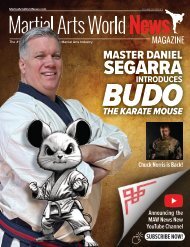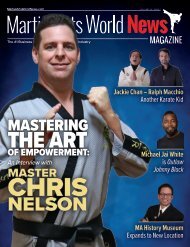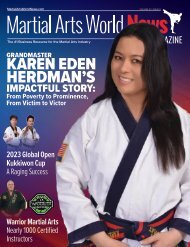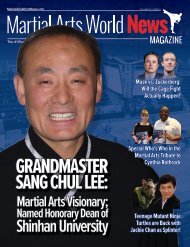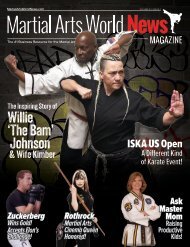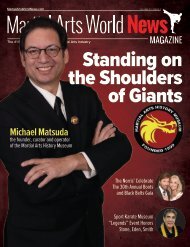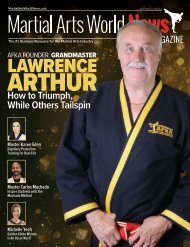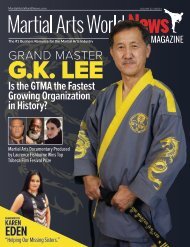Martial Arts World News Magazine - Volume 22 | Issue 2
The #1 Business Resource for the Martial Arts Industry
The #1 Business Resource for the Martial Arts Industry
Create successful ePaper yourself
Turn your PDF publications into a flip-book with our unique Google optimized e-Paper software.
NINJA BUSINESS TACTICS<br />
Ah-shu Defined<br />
People have asked about the meaning of the An-shu title that Rumiko and I use.<br />
Though the world knows our school as SKH Quest Center for <strong>Martial</strong> <strong>Arts</strong> in Dayton,<br />
the original Japanese name for our dojo is Kasumi-An.<br />
I have used that name since the 1980s to describe my dojo and<br />
the training method of that dojo, way before we founded the current<br />
SKH Quest network in the mid-1990s.<br />
The Kasumi-An is specifically the house I live in and the dojo<br />
and meditation halls in my house. People come to that Kasumi-An<br />
for private lessons with me. By extension, Kasumi-An also refers to<br />
the training curriculum system program taught in all dojos across<br />
the globe that operate as branches furthering my work in the world.<br />
Kasumi translates from Japanese to “haze” in English. There<br />
is the obvious homonym where “haze” sounds like “Hayes”, but<br />
beyond that, ancient legends from Japan’s warrior past<br />
often give kasumi an association with the lore of<br />
the ninja. For example, the recluse mountain<br />
yogi Kasumi Gakure Doshi was the teacher of<br />
Daisuke Togakure in the historical Japanese<br />
tradition I studied on my way to developing<br />
To-Shin Do. Kasumi implies that the enemy<br />
thinks he sees and knows what and who<br />
we are, but he is deluded and we encourage<br />
him to hold that delusion.<br />
The An is a place of refuge, usually a<br />
small cottage temple on the grounds of a<br />
larger temple to which warriors or monks<br />
could retreat in the old culture of Japan. The An<br />
is a place you can go to get a break<br />
from all the craziness in life, all<br />
the heartbreak and heartache,<br />
the frustration, the<br />
overdone pointless<br />
competition, all the<br />
meanness, all the<br />
compelling distraction<br />
from what is<br />
truly important.<br />
Taking refuge in<br />
the An, you get your batteries re-charged, your juices re-bubbled,<br />
your vision re-focused, your intentions re-calibrated. You get back<br />
in connection with the touch of life itself. On retreat, you get back<br />
to what is real for you, or you practice arts or meditations that allow<br />
you to expand to new broader horizons what is real. After your time<br />
in the An, you are ready to re-enter your community refreshed and<br />
renewed and re-pledged to making the world a better, healthier,<br />
saner, safer place for all.<br />
Shu in Japanese means one who runs an operation or facility of<br />
some sort. The common translation is “master”, but it really implies<br />
more like “facilitator”, in the sense of being the stable master<br />
where horses are trained, or range master where firearms are<br />
taught. An-shu is then retreat master, or “one who facilitates the<br />
retreat cottage”. I hyphenate the title so the English hints at the two<br />
Japanese kanji letters for An and Shu that form the word; it could<br />
just as well be written Anshu.<br />
An-shu is a very humble title of service, deliberately chosen in<br />
my mid-40s when I went from 30 years as a self-oriented student<br />
of the martial arts to a new focus on assisting others to find the<br />
martial truths that I had attained. An-shu is not a ninja title as such.<br />
Yes, I am aware that a few individuals pretending to a past of “secret<br />
ninja training” have adopted my An-shu title in imitation; that<br />
is so predictable that there is little I can say about it. You cannot<br />
properly be titled An-shu if you are not head of an An.<br />
Others suggested I use an impressive title like soke, which<br />
means “original founding family”, or saiko shihan, which means<br />
“top-ranked master”, or kan-cho, which means “training hall headmaster”.<br />
Those are oft-used titles for head of a martial group, but<br />
those seemed to miss the mark of what I wanted to communicate.<br />
I want to be on record as a person who vowed to devote himself<br />
to assisting others as a guide on the path. An-shu as “custodian<br />
of the spiritual inn” seems warmer and more in line with my focus<br />
these days in my 60s. No need for a grand and formal high-falutin’<br />
title, because as I have often commented before, my real rank is<br />
“Stephen K. Hayes”, the most honest and powerful title I could use.<br />
AN-SHU STEPHEN HAYES has authored more than 20 books, worked as a body guard for the Dali<br />
Lama, supervised over 30 school locations worldwide, and was named “A legend; one of the 10 most influential<br />
living martial artists in the world” by Black Belt <strong>Magazine</strong><br />
62 MARTIAL ARTS WORLD NEWS VOLUME <strong>22</strong> | ISSUE 2





